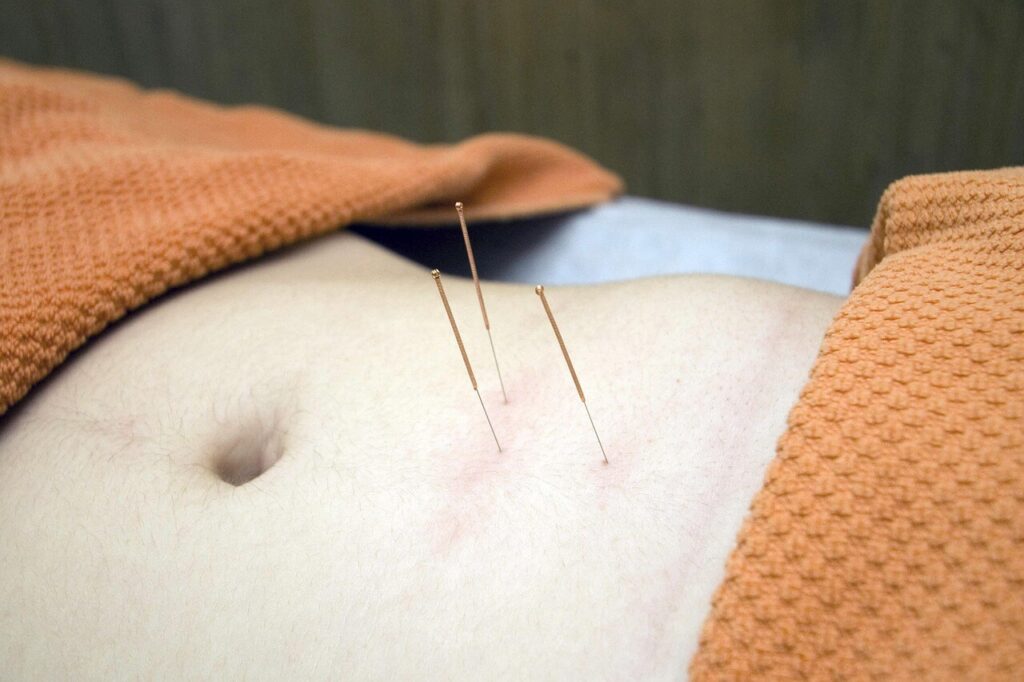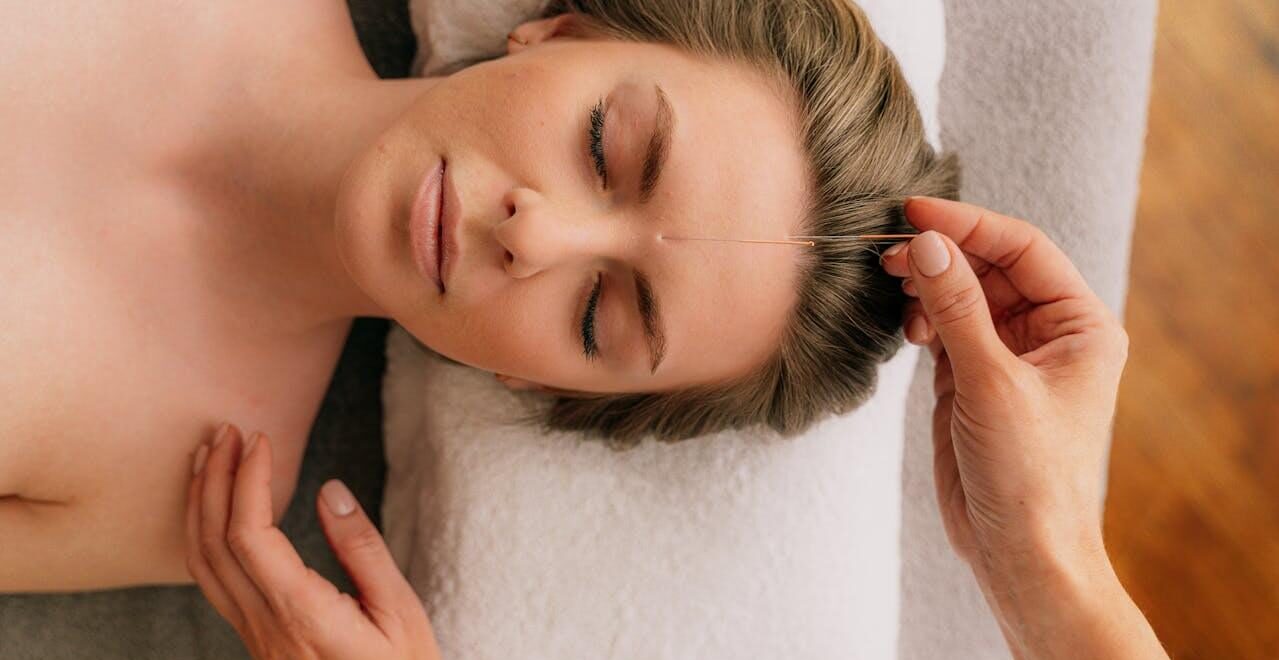Trying to conceive? Then you’re likely doing all the right things—cutting back on alcohol, managing stress, eating clean, and exercising. You’ve got the foundations covered. But you keep hearing about acupuncture for fertility, too. And you’re wondering if it could help—or if it’s just hype.
Sound familiar? If so, you’re right to be curious. Acupuncture is an ancient practice with a long list of benefits. And yes—fertility support is one of them. Keep reading to learn how acupuncture may help boost your odds of getting pregnant.
But first, let’s back up and cover the basics.
What is Acupuncture?
Acupuncture is a practice that’s a core part of traditional Chinese medicine (TCM). According to TCM theory, every person has a life force energy, or qi, that runs through the body. This energy moves along 14 energetic pathways known as meridians. When qi flows freely, you feel well. But when it becomes blocked or imbalanced, symptoms or illness can show up.

That’s where acupuncture steps in. Acupuncture practitioners place thin, hairlike needles on specific points on these energetic meridians. Stimulating these acupoints is believed to promote energy flow and restore balance within your body.
While acupuncture has been around for over 3,000 years, modern research is still catching up. Like most holistic therapies, it hasn’t been studied as extensively as medical treatments. Still, evidence suggests acupuncture offers a wide range of benefits. It’s been shown to help with pain, sleep issues, digestion, stress, and you guessed it—even fertility.
How Can Acupuncture Boost Fertility?
Acupuncture has the potential to improve fertility in a few different ways:
Improves blood flow
Acupuncture improves blood flow to the ovaries and uterus—both essential for female fertility.2,3 Healthy eggs rely on a steady flow of oxygen-rich blood to the ovaries.
Blood flow is also vital for implantation, the process where the fertilized egg hooks onto the uterine wall.4 Research shows acupuncture improves uterine blood flow. This may increase the odds of successful implantation.3
Reduces stress & anxiety
Trying to conceive can be exciting—but also extremely stressful. Unfortunately, stress can interfere with your ability to get pregnant. It can reduce libido, throw off hormone balance, and even disrupt ovulation.
That’s where acupuncture can help. It’s shown to help regulate the nervous system and promote a sense of calm.5,6 By easing stress and anxiety, acupuncture may improve your chances of conceiving.
Balances hormones
Getting pregnant requires a delicate balance of hormones—and that’s where acupuncture may help. It helps regulate the endocrine system, the hub in charge of hormone release. This includes fertility hormones like estrogen, progesterone, follicle-stimulating hormone (FSH), and luteinizing hormone (LH).
Research suggests acupuncture may help balance levels of hormones like estrogen and progesterone.7 This may help regulate your menstrual cycle and make it easier to get pregnant.
Improves sperm
Acupuncture may benefit male fertility, too. Studies suggest treatments may improve sperm count and motility.8
Promotes overall well-being
Healthy bodies create healthy babies. Luckily, it offers a wide range of benefits that go beyond fertility. Whether you’re struggling with insomnia, allergies, pain, poor digestion, or PCOS, acupuncture can help.9 And the healthier you are overall, the easier it is to conceive.
How Effective is Acupuncture for Fertility?
That’s hard to say—more research is certainly needed. But when it comes to improving pregnancy rates, studies show promising results.
One study looked at whether acupuncture affected IVF outcomes. Some women received treatments before and after embryo transfer, while others did not. Those who received acupuncture had significantly less anxiety, higher pregnancy rates, and more live births. In fact, their odds of getting pregnant in the acupuncture group were nearly double.10

Another study echoed these findings. Women who received acupuncture 25 minutes before and after embryo transfer had a pregnancy rate of 42.5%, compared to just 26.3% in the control group.11
These results are impressive. However, more research is needed to fully understand how acupuncture affects fertility.
How Many Fertility Acupuncture Sessions Do You Need?
It depends on the person and their unique health situation. At Anchored in Health, our acupuncturist recommends one treatment every other week if you’re trying to get pregnant. However, if you have other health issues going on, you may need more sessions. Your acupuncturist will personalize a treatment plan that’s right for you.
When Should I Start Acupuncture for Fertility Treatments?

It can be helpful at any stage in your fertility journey. That said, its effects are cumulative. So starting early on may deliver the best benefits.
A good rule of thumb is to start optimizing your health at least three months before trying to conceive. Think nutrition, stress management, gentle movement, and quality sleep. But acupuncture can be a valuable addition to your pre-conception toolkit.
And the benefits don’t stop there. Many people continue acupuncture after conception to help manage common pregnancy symptoms. It can help ease low back pain, nausea, vomiting, and insomnia—and even help prepare your body for labor and delivery.
What Acupuncture Points are Used for Fertility?
If you’re new to fertility acupuncture, you’re likely wondering, “Where do the needles go?” But there’s no one-size-fits-all answer. The acupoints depend on your individual needs and may vary from session to session.
Common acupuncture points for fertility include:
- Kidney 3 (Taixi) – Located on the inside of the ankle, in the dip between the ankle bone and Achilles tendon. This point is part of the kidney meridian, which plays a key role in reproductive health. Stimulating it may help balance hormones, regulate menstrual cycles, and support fertility.
- Ren 4 (Guanyuan) – Found in the center of the abdomen just below your navel. This point is part of the ren meridian, also called the “conception vessel.” This acupoint is often used to treat menstrual issues and prepare the body for pregnancy.
- Ren 6 (Qihai) – Located about two inches below your belly button, this point is also part of the conception vessel. It’s thought to strengthen the reproductive organs and improve blood flow.
- Spleen 6 (Sanyinjiao) – This acupoint sits on the inside of the lower leg, about three inches above the ankle bone. This is a go-to point to improve blood flow to the uterus, regulate menstruation, and support reproductive function.
- Liver 3 (Taichong) – Located on the top of your foot, in the space between the first and second toes. This acupoint is said to relieve menstrual issues and promote emotional balance.
- Zi gong (aka “Uterus point”) – Found on the lower abdomen, about three inches to the side of the belly button. Stimulating this point is thought to enhance fertility by improving blood flow to the uterus and ovaries.
Other acupoints may be included depending on each patient’s health concerns, whether that’s PCOS, blood sugar issues, or stress.
Does Fertility Acupuncture Have Any Risks?
Acupuncture has few risks as long as it’s performed by a licensed acupuncturist. Side effects are rare but may include soreness or mild bruising. It’s a safe option whether you’re trying to conceive or already pregnant—and can be used alongside medical treatments. For best results, choose a practitioner who has experience with fertility acupuncture.
Trying to Conceive? Boost your Fertility with Acupuncture in Orland Park, IL
Trying to get pregnant can be an emotional rollercoaster, but you don’t have to go through it alone. At Anchored in Health, we offer fertility acupuncture to support your body, ease stress, and improve your chances of conceiving.
Our certified acupuncturist brings over 20 years of experience treating a wide range of concerns—from hormone imbalances to fertility challenges and beyond.
If you’re in the Chicago area and could use some support in your fertility journey, follow these steps:
- Contact us with questions
- Book your first fertility acupuncture treatment here.
- Start optimizing your fertility naturally!
Other Alternative Health Services Offered at Anchored in Health in Orland Park, IL
Anchored in Health provides a variety of services to help you feel your best—whether you’re trying to conceive or simply want to improve your well-being. This includes chiropractic care, functional medicine, massage therapy, and the Shape ReClaimed program. We also offer genetic testing, thermography, and vibrant wellness testing so you can gain deeper insights into your body’s unique needs.
Ready to feel more balanced and supported on your fertility journey? Reach out to us today!
Sources:
- Acupuncture | StatPearls
- Systematic review of acupuncture to improve ovarian function in women with poor ovarian response | PMC
- Acupuncture in improving endometrial receptivity: a systematic review and meta-analysis | PMC
- Importance of blood flow to human implantation | Oxford Academic
- Does Acupuncture Reduce Stress Over Time? A Clinical Heart Rate Variability Study in Hypertensive Patients | PMC
- Randomised controlled trial on the use of acupuncture in adults with chronic, non-responding anxiety symptoms | Pubmed
- A Literature Review of Women’s Sex Hormone Changes by Acupuncture Treatment: Analysis of Human and Animal Studies | PMC
- The effectiveness and safety of acupuncture for poor semen quality in infertile males: a systematic review and meta-analysis | PMC
- Effects of TCM on polycystic ovary syndrome and its cellular endocrine mechanism | Frontiers in Endocrinology
- Effectiveness of acupuncture on pregnancy success rates for women undergoing in vitro fertilization: A randomized controlled trial | Science Direct
- Influence of acupuncture on the pregnancy rate in patients who undergo assisted reproduction therapy | Pubmed
Disclaimer: The information provided on this blog is for educational and informational purposes only and is not intended to diagnose, treat, cure, or prevent any disease. The content is not a substitute for professional medical advice, diagnosis, or treatment. Always seek the guidance of a qualified healthcare provider with any questions you may have regarding your health or a medical condition.
Reading this blog does not establish a doctor-patient relationship between you and Anchored In Health or any of its practitioners. Reliance on any information provided in this blog is solely at your own risk.
